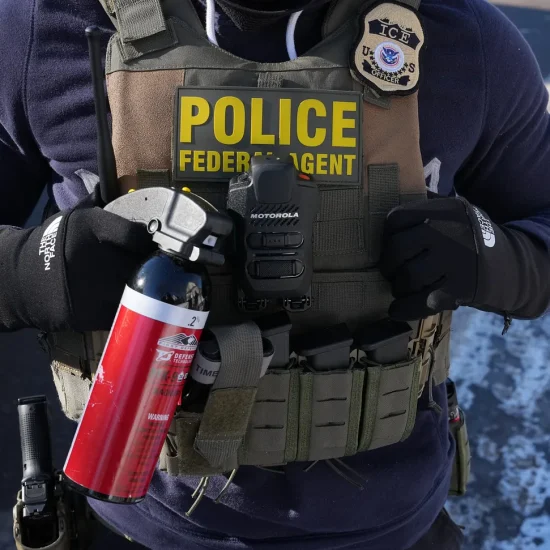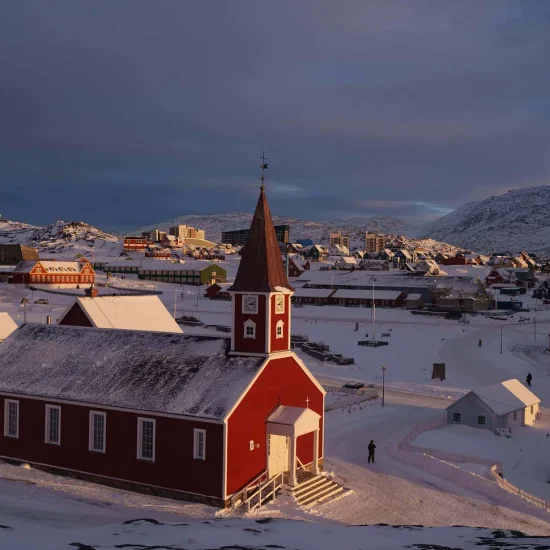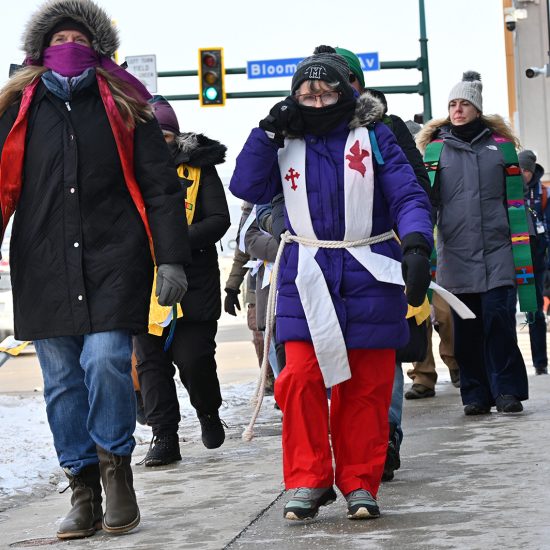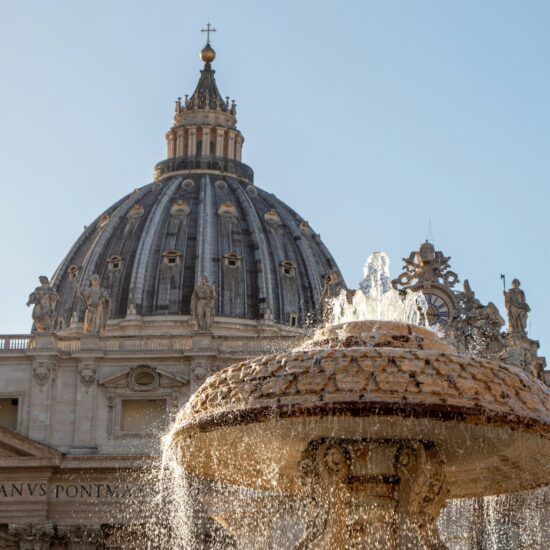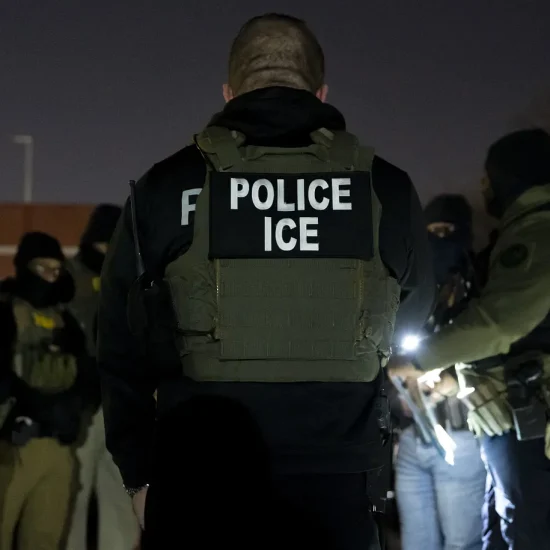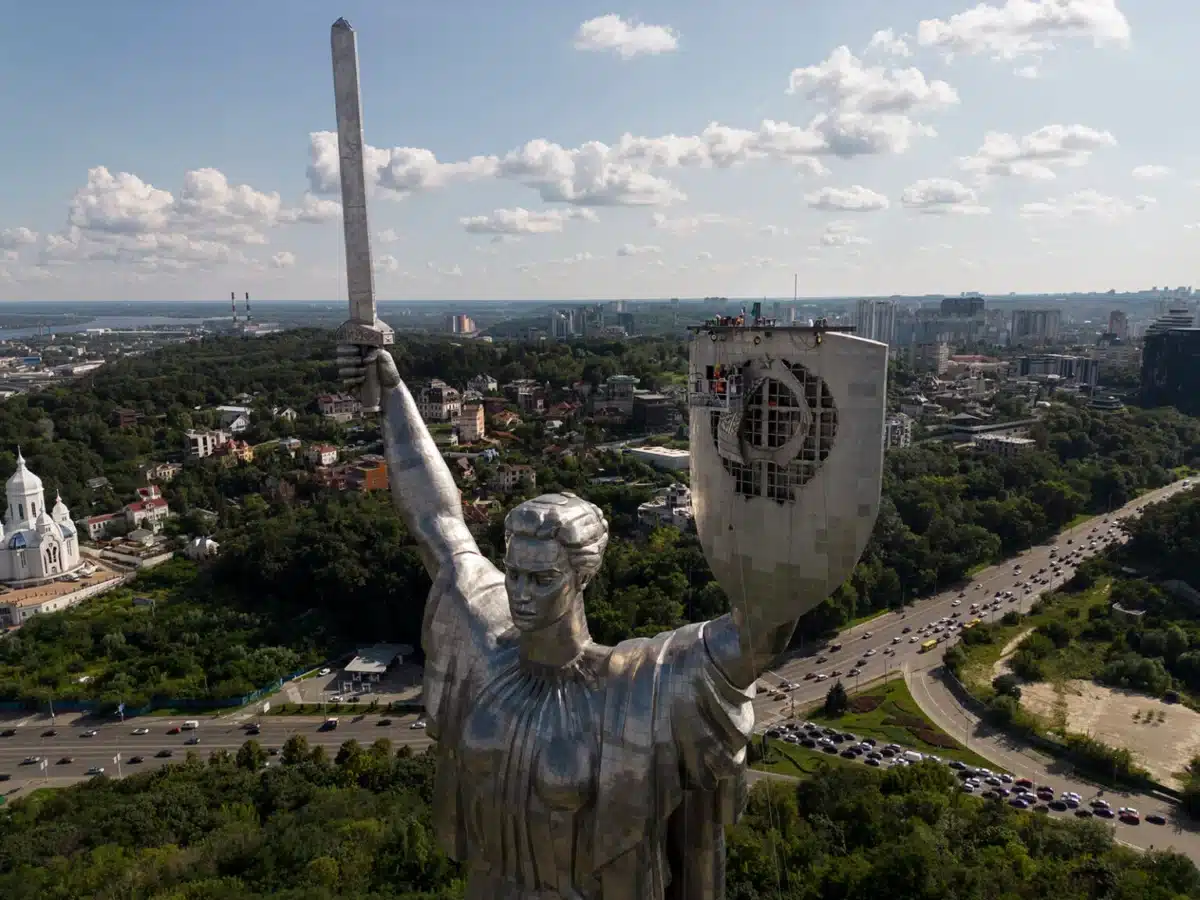
VATICAN CITY (RNS) — In a speech to political and diplomatic authorities in Portugal during his visit in late July, Pope Francis reminded Europe of its commitment to making peace after the horrors of the world wars.
The “real Europe,” Francis said, “triggered the spark of reconciliation, by realizing the dream of building tomorrow with yesterday’s enemy, of creating paths for dialogue, roads of inclusion, by developing a diplomacy of peace that quiets conflicts and eases tensions, that is capable of recognizing the feeblest signs of appeasement and of reading between the most crooked lines.”
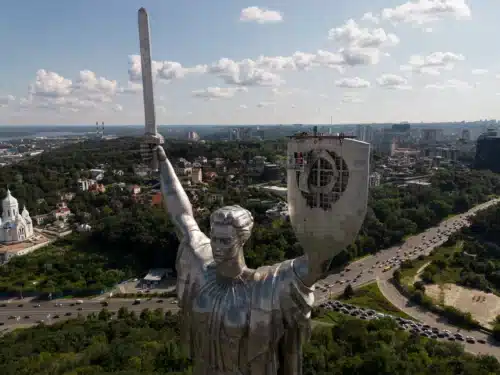
The Motherland Monument is seen after workers removed a Soviet emblem from the shield of the monument in Kyiv, Ukraine, Tuesday, Aug. 1, 2023. (AP Photo/Jae C. Hong)
His words seemed to be an admission that the Vatican, the smallest country in the world, cannot bring Russia, the largest country in the world, to the negotiating table by itself. But if not, it has not been for lack of trying.
As much of the Western world has focused on ending the war with pressure on Russian President Vladimir Putin, Francis has remained firm in his belief that peace in the region cannot be achieved without dialogue with Russia. Francis is among the few world leaders who have kept the doors of dialogue open, mostly avoiding demonizing Russia while criticizing the economic sanctions that, in his view, do more to harm common people than change the minds of political stakeholders.
Meanwhile, Francis has conducted what he called, in an interview with the Spanish magazine Vida Nueva published on Friday (Aug. 4), “a peace offensive.”
His primary weapon in this offensive has been Cardinal Matteo Zuppi, the head of the Italian Bishop’s Conference, who has years of experience in diplomacy and was appointed by Francis to lead the Vatican peace initiative in May. In July Zuppi met with Putin advisers in Moscow and also visited Washington, where he sat with President Joe Biden for two hours.
Beijing will be Zuppi’s next destination, because Francis believes that, along with the United States, “they hold the key to lower the tension of the conflict.”
In his push for peace, Francis isn’t adhering to the script laid out by the Western powers, which has valorized the vow by the leaders of Ukraine to push the Russian invaders out. Commenting on Zuppi’s mission, Francis told the Spanish magazine that in Kyiv, “they keep to the idea of victory without opting for mediation.” The odds for peace look better in Russia, he said, where “there is an attitude that can be described as diplomatic.”
The timing of Zuppi’s trip to Washington was notable in that the meeting occurred immediately after Biden’s unpopular decision to send Ukraine cluster munitions, which are banned by 125 countries. The Holy See was among the first 30 countries to back the ban, which went into effect in 2010.
“What Pope Francis is attempting to do is to create opportunities for dialogue,” said Victor Gaetan, author of “God’s Diplomats: Pope Francis, Vatican Diplomacy, and America’s Armageddon.”
“Don’t forget that Pope Francis is among the most well-informed men on the planet and the only head of state who has no military, economic, or political designs in this war,” Gaetan said.
In the interview, Francis said Vatican Secretary of State Cardinal Pietro Parolin is organizing a peace summit of religious leaders in Abu Dhabi before the meeting on climate change scheduled for the end of November in Dubai. Most importantly, Francis said he wishes to appoint a permanent representative who can act as a bridge between Russia and Ukraine.
In emphasizing the need for dialogue and peace, the pope is keeping with the long-held tradition of Vatican diplomacy of acting as an impartial arbiter for peace, based on the familiar principle “hate the sin, not the sinner.”
“The mission of the church is to be the mediator, to be the reconciler, to bring the parties in conflict to the table,” Gaetan explained. For Francis, he added, “dialogue is the oxygen of peace which opens minds and hearts to encounter, to break down the walls of violence and division.”
The pope has committed to this approach from the first days of the conflict: On hearing of the Russian invasion of Ukraine in February 2022, he broke Vatican protocol to visit the Russian ambassador to the Holy See in Rome. Normally, ambassadors visit the pope in an audience at the Vatican. The pontiff has also called Putin personally to ask him to stop the violence in Ukraine.
Francis has met with Putin more than any other political leader — six times — and has spoken to Ukrainian President Volodymyr Zelenskyy on several occasions, while declining invitations to visit Kyiv as other global leaders have to show their support. Francis said he will visit Kyiv only if he can also visit Moscow, where no pope has set foot before.
“Some people might say: but you are in favor of Putin! No. I am not. To state that would be simplistic and wrong,” Francis said in an interview with the Jesuit magazine Civiltà Cattolica last summer. “I am simply against reducing something complex to the distinction between the good guys and the bad guys, without reflecting on the roots and interests (in the conflict), which are very complex.”
In the same interview, he suggested that Putin’s aggression in Ukraine had been in part provoked “by NATO barking at Russia’s door.”
The pope has brought home wins through dialogue before. In 2016, he became the first pope ever to meet with the Patriarch of the Russian Orthodox Church in the airport at Havana, Cuba. At the end of that year, U.S. President Barack Obama thanked Francis for opening the way to a historic detente between his country and Cuba, which yielded the release of Alan Gross, an American being held in Cuban custody.
Francis’ idea of dialogue can include frank talk. In an online video conference in May 2022, their first encounter since Havana, Francis urged Patriarch Kirill of Moscow not to become “Putin’s altar boy.” Similarly, said Gaetan, Francis has refused to serve as a mouthpiece for the West.
“There were great pressures on Pope Francis to hop on the train and join the other nations in criticizing Russia, Putin and Patriarch Kirill directly,” Gaetan said. “He demonstrated that he would not do that.”
But in Lisbon, Francis showed an awareness that his lonely crusade for peace might be failing. In a meeting with 15 young Ukrainians during his visit in Lisbon, Portugal, for World Youth Day on Thursday (Aug. 3), the pope reportedly apologized for not being able to solve the conflict.
But if the doors of dialogue are shut for now, Francis doesn’t seem to want to stop knocking. At the end of August, Francis will visit the small Catholic community in Mongolia, a country nestled between Russia and China, where he is expected to renew his pleas for peace with its larger neighboring countries.

